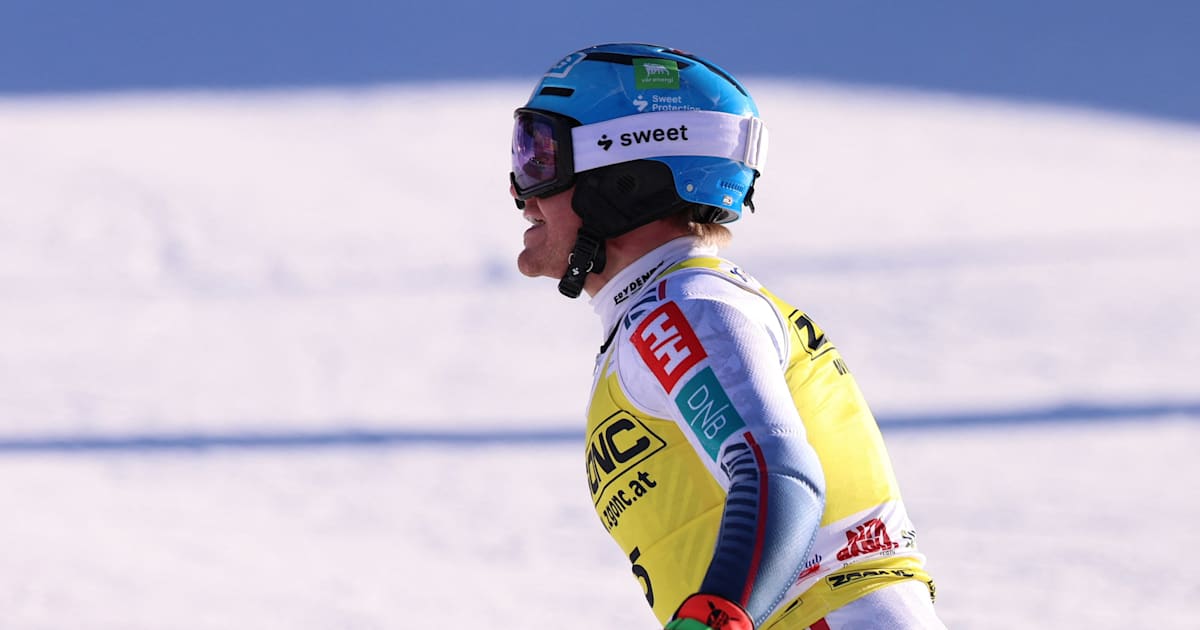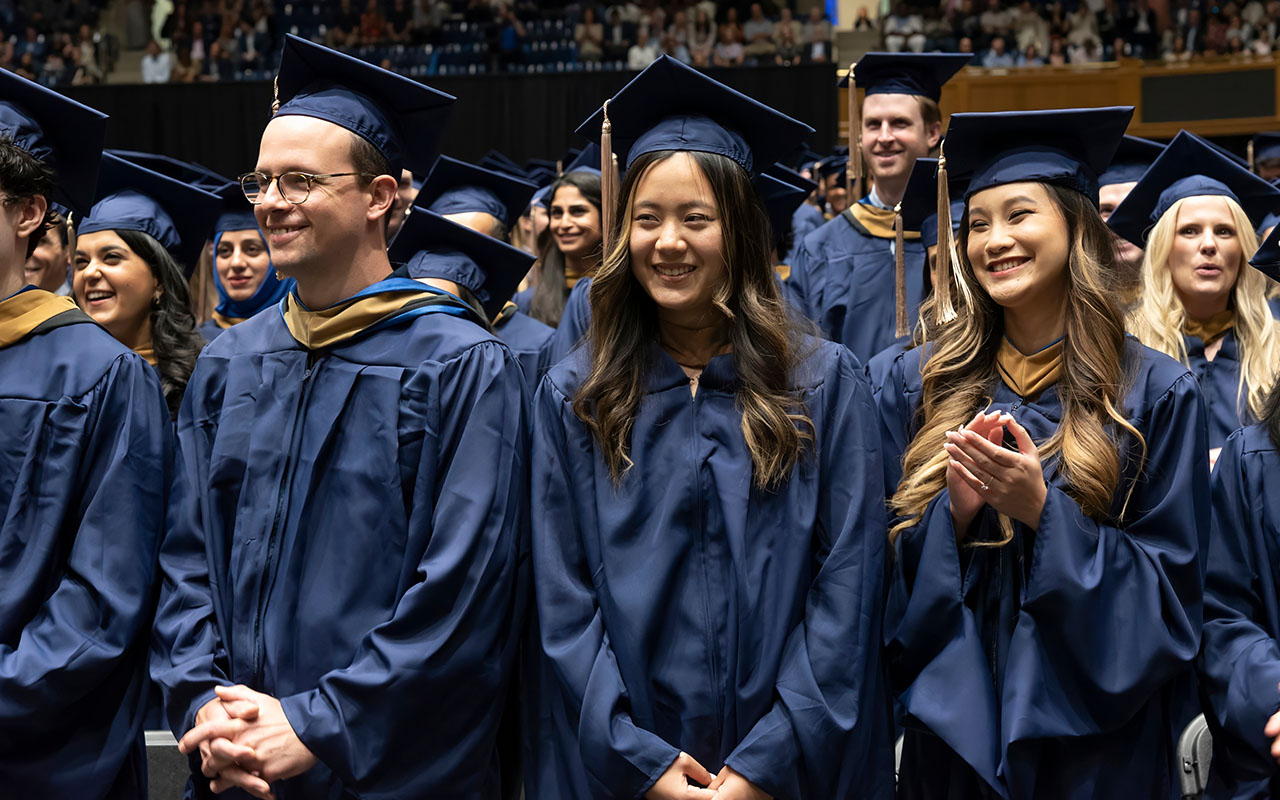World
Traditional garments, elegant gowns, and out-of-this-world outfits: Bates has a passion for Trashion

At the Bates Trashion Show, one person’s trash is not just another’s treasure, but perhaps even another’s trend.
The event, held annually after the Harvest Meal in Commons, invites students, faculty, and staff to design and display couture outfits fashioned from campus waste.
Bates has been a carbon-neutral institution since 2019 and aims to become climate-positive by 2030. The college leads numerous projects geared toward improving sustainability on campus. The Trashion Show is one such effort, merging fun, fashion, and environmental responsibility to illustrate the volume of waste created at Bates.
Awaiting the start of the 19th annual show on Wednesday evening, a wide gathering of campus community members — students plus faculty and staff, some with their children — milled about in the Clifton Daggett Gray Athletic Building, snacking on assorted desserts and dancing to music by student DJ Ethan Rayburn ’25 of Blacklick, Ohio, while folks took photos in front of a fall-themed photo booth.
Beyond the crowd, the empty Trashion Show stage anticipated its models. Designers snuck backstage, creations in hand, to make final adjustments before displaying their outfits under runway lights.
Bates President Garry W. Jenkins arrived and adopted a temporary title of fashion critic as he joined the judges’ panel for the night.
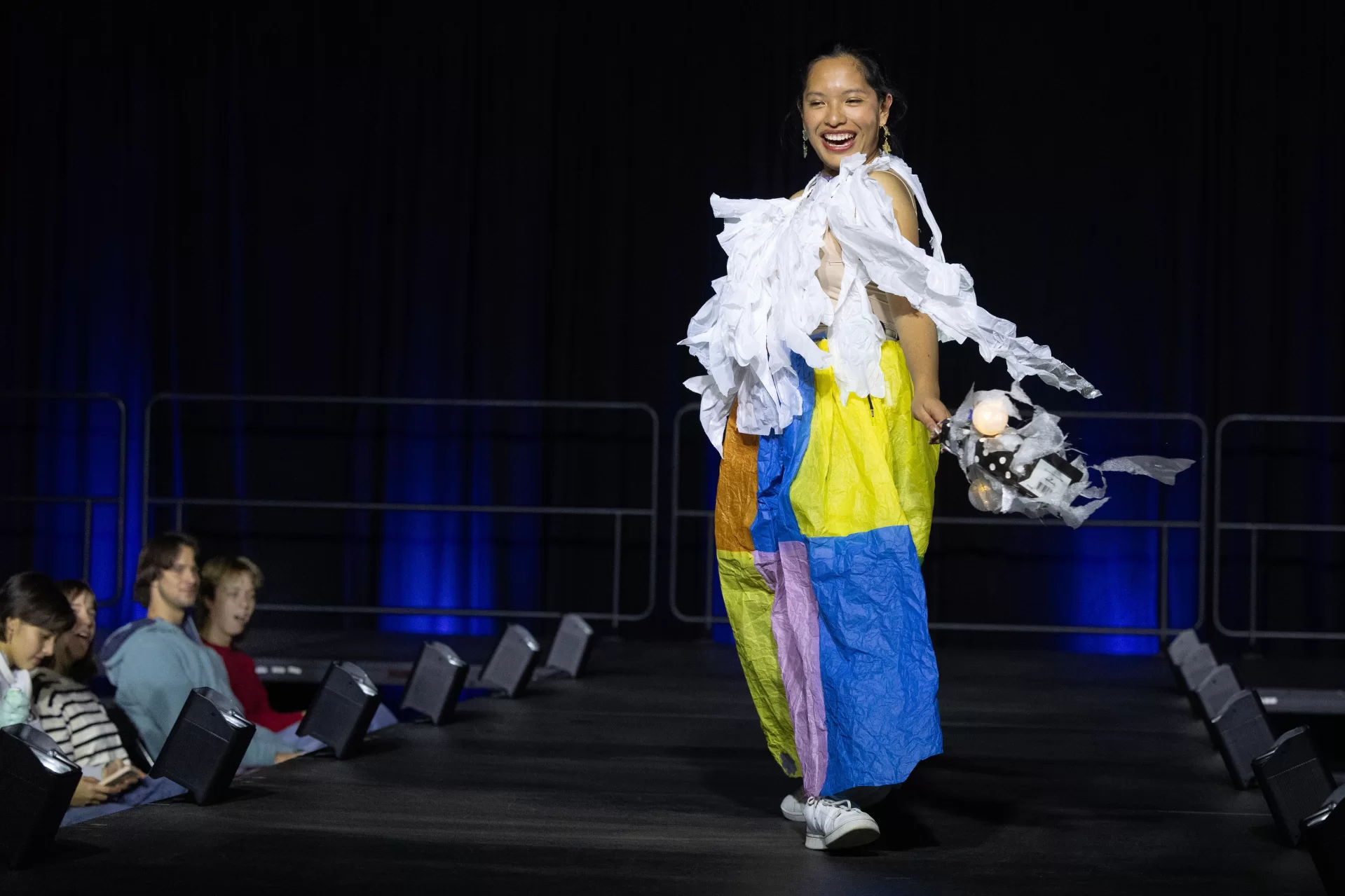
“This is quintessential Bates,” Jenkins said. “It’s fun, but it’s also raising awareness of important issues and people celebrating fellow faculty, staff, students coming together.”
As the show began, the crowd conveyed this community sentiment with roars of applause and yells for the models. Students were especially enthused for model and designer Cheryl Lacey, a longtime Bates staff member and director of Dining Services.
“I know how much our staff care about the students and to see them give the love right back is a beautiful thing,” Jenkins said.
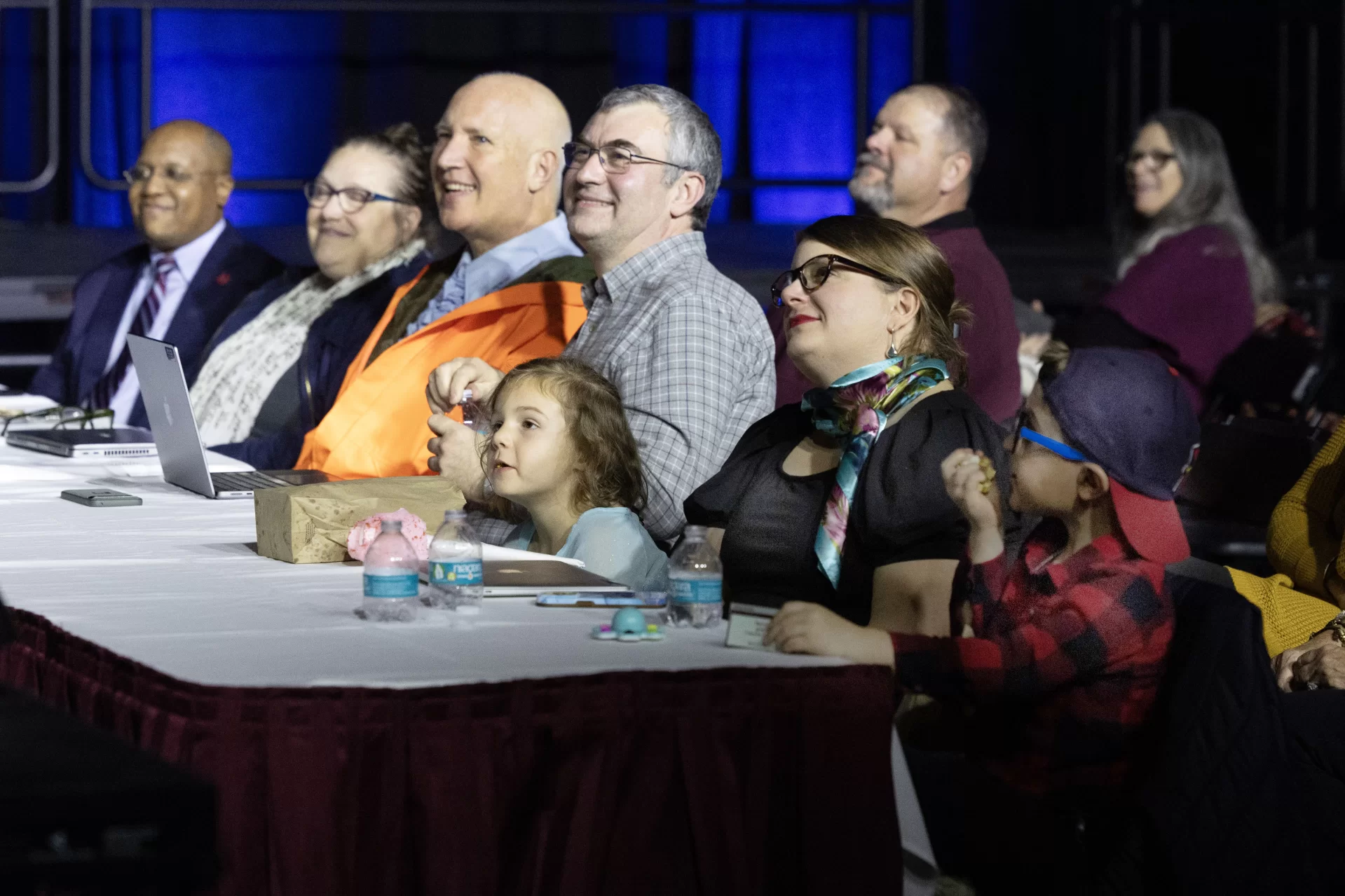
Though the show was held in a space nicknamed the Cage, the participating students, faculty, and staff were certainly not constrained when it came to making statements with their fashionable, trash-laden pieces. Designs included an outfit fashioned in a traditional Nepali style from gift wrapping paper, a lengthy skirt and train made of shopping bags, and a top and skirt composed of food packaging waste.
After deliberation, the judges awarded co-designers Annie Robinson ’26 of Atlanta, Ga., and Grace Thomas ’26 of Bethesda, Md., first place for their elegant white gown made from recycled course readings. Second place went to Lacey, and Professor of French and Francophone Studies Kirk Read received third place.
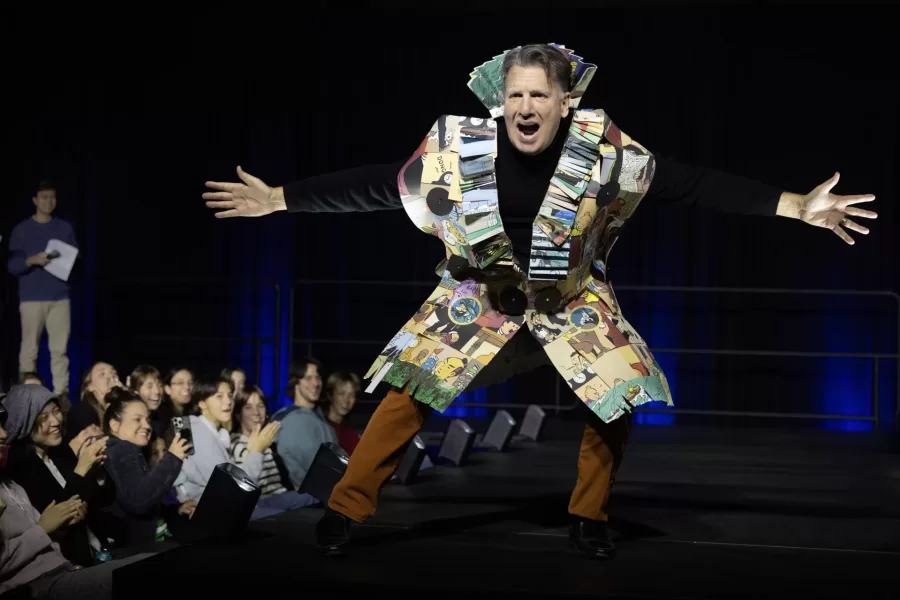
The Bates student EcoReps, Bates College Student Government, and Dining, Conferences and Campus Events co-hosted the Trashion Show. EcoReps Julia Neumann ’25 of Park City, Utah, and Aneeza Ahmad ’25 of Sharon, Mass., managed the show. The emcees were BCSG co-presidents Sivani Arvapalli ’26 of South Windsor, Conn., and Ethan Chan ’25 of Westborough, Mass.
Each of the eight designer/model groups presented different interpretations of Trashion, style, and sustainability:
EcoReps Take the Stage
The Team: Isabelle Larson ’25 of East Aurora, N.Y., and Nimco Jama ’25 of Hargeisa, Somaliland
Signature Use of Trash: Grocery bags
As Bates EcoReps, both Larson and Jama are eco-minded.
The students chose plastic and paper grocery bags as their design materials because of the items’ ubiquitous presence, and therefore heavy contribution to waste, in daily life.
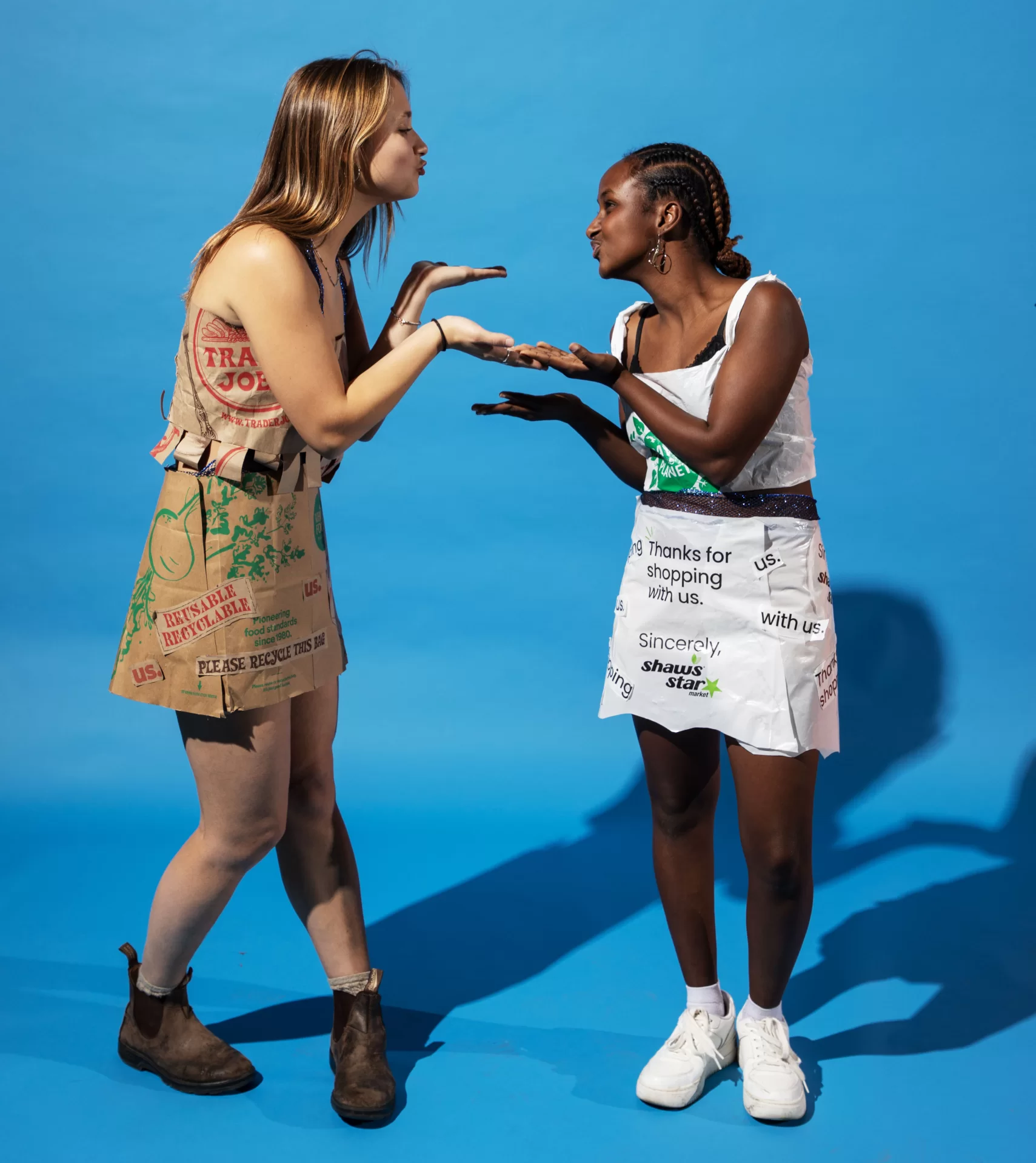
“We wanted the simplicity of our costumes to reflect everyday use of these materials,” said Larson, a double major in biology and earth and climate sciences. “They’re so common.”
Jama used plastic bags for her outfit, while Larson used paper. This was intentional, to highlight the small yet powerful choices every person can make, such as simply switching from plastic to paper bags to reduce waste.
“When you’re met with these choices about being sustainable, there is always an option,” Larson said. “Even with grocery bags, you can have an impact and limit your plastic use.”
When the show paused for the judges’ deliberation, student EcoReps Maddie Weinstein ’27 and Caroline Mayer ’26 took the stage to quiz students about recycling facts, such as which Bates dorm recycles the least and how to effectively clean different materials before recycling them.
Jama, a biology major, said that the segment was a good opportunity for students to take away messages about how to recycle correctly. “A lot of people usually get confused about very small things that do make a big impact on whether you recycle it or put it in a trash can,” Jama said.
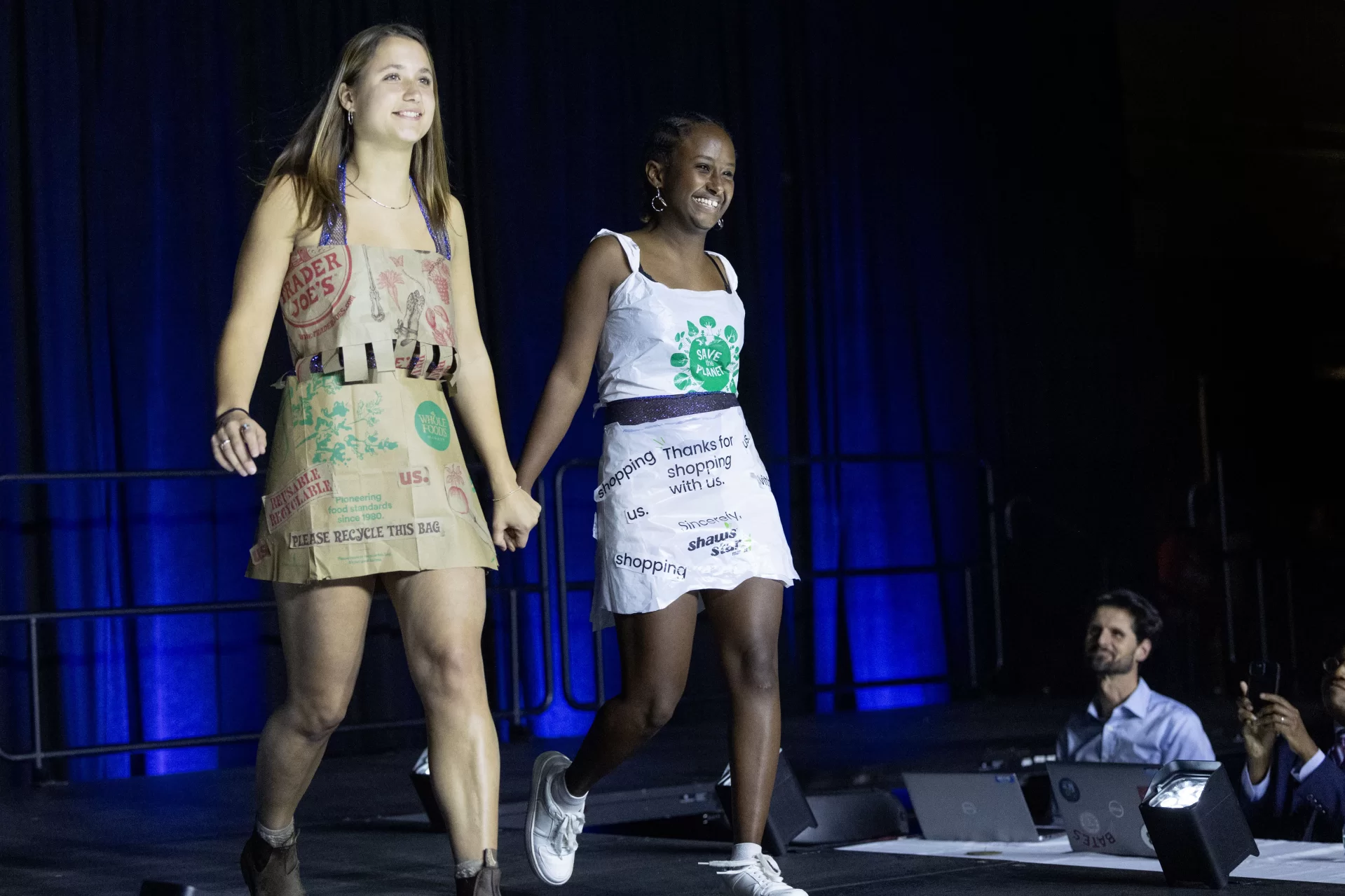
The Trashion Show is far from the EcoReps’ only foray into the world of sustainability. Jama, for example, works at the Bates Garden known as the Plot, farming organic produce used in on-campus dining.
“I have been working for the Plot since my freshman year, and I’ve kind of been involved in that way, really wanting to make an impact on campus,” Jama said.
The Trashion Show fits neatly into Larson’s academic work, which centers heavily around sustainability.
“I talk about sustainability and climate change every single day,” Larson said. “It’s just another way to represent activism.”
Read What You Sew
The Team: Annie Robinson ’26 of Atlanta, Ga., and Grace Thomas ’26 of Bethesda, Md.
Signature Use of Trash: Printed academic readings
Co-designers Robinson and Thomas won first prize, a $75 gift card to Forage Market, for their magnificent white gown crafted mainly from paper and accessorized with soda tabs.
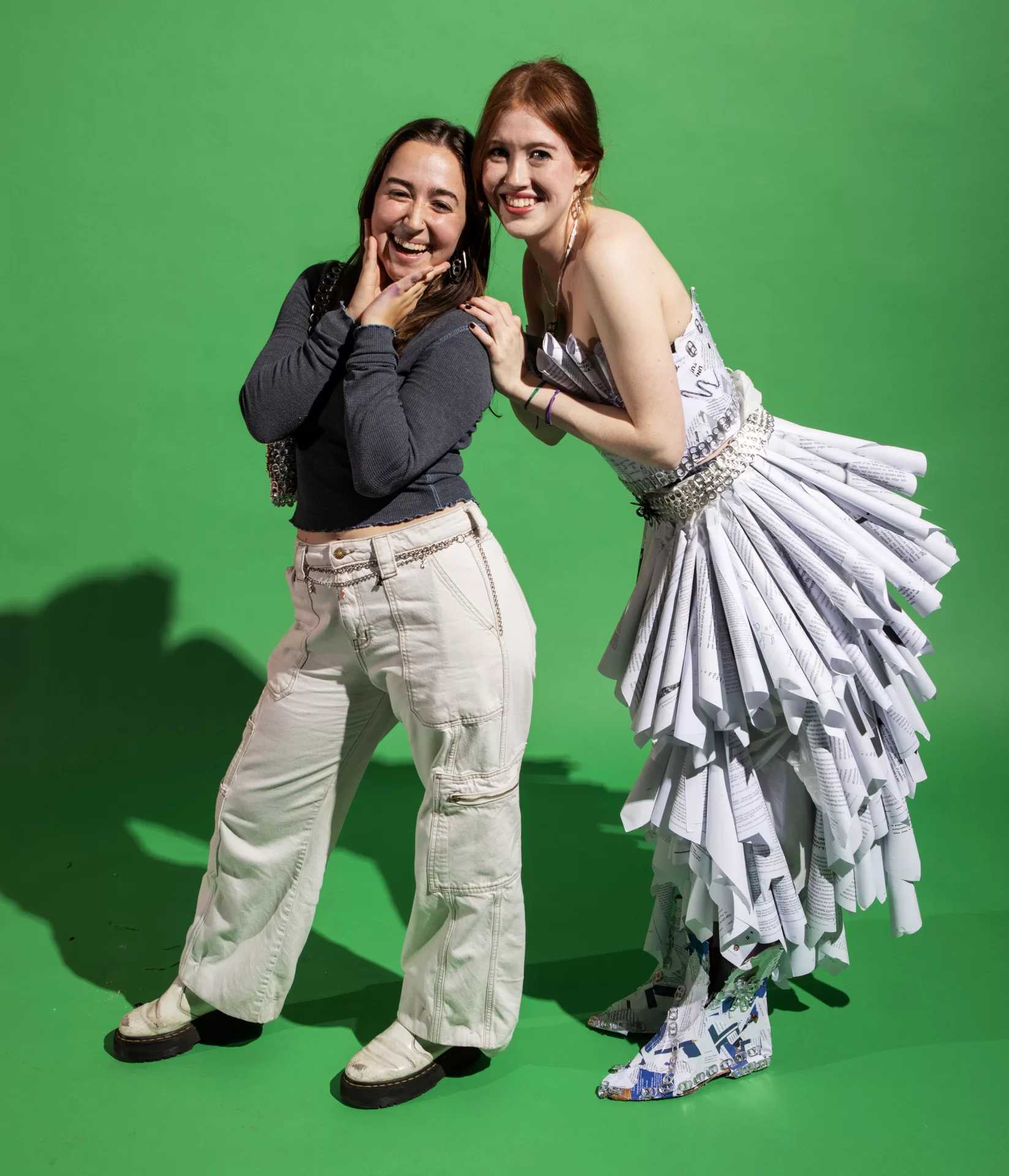
Robinson was initially inspired to participate in the Trashion Show when reflecting on a trashion-esque project she made in third grade. She reached out to Thomas, an art major, to make this year’s dress, and the two took inspiration from Pinterest and other online designs.
Robinson and Thomas made the dress, modeled by Thomas, from printed paper readings, both from their own coursework and donated by friends. They made the bouncy skirt from stacks of paper rolled up, then placed into tiered layers, and finally tied and stapled together. Variously colored annotations and even a JSTOR logo peeked out from between layers.
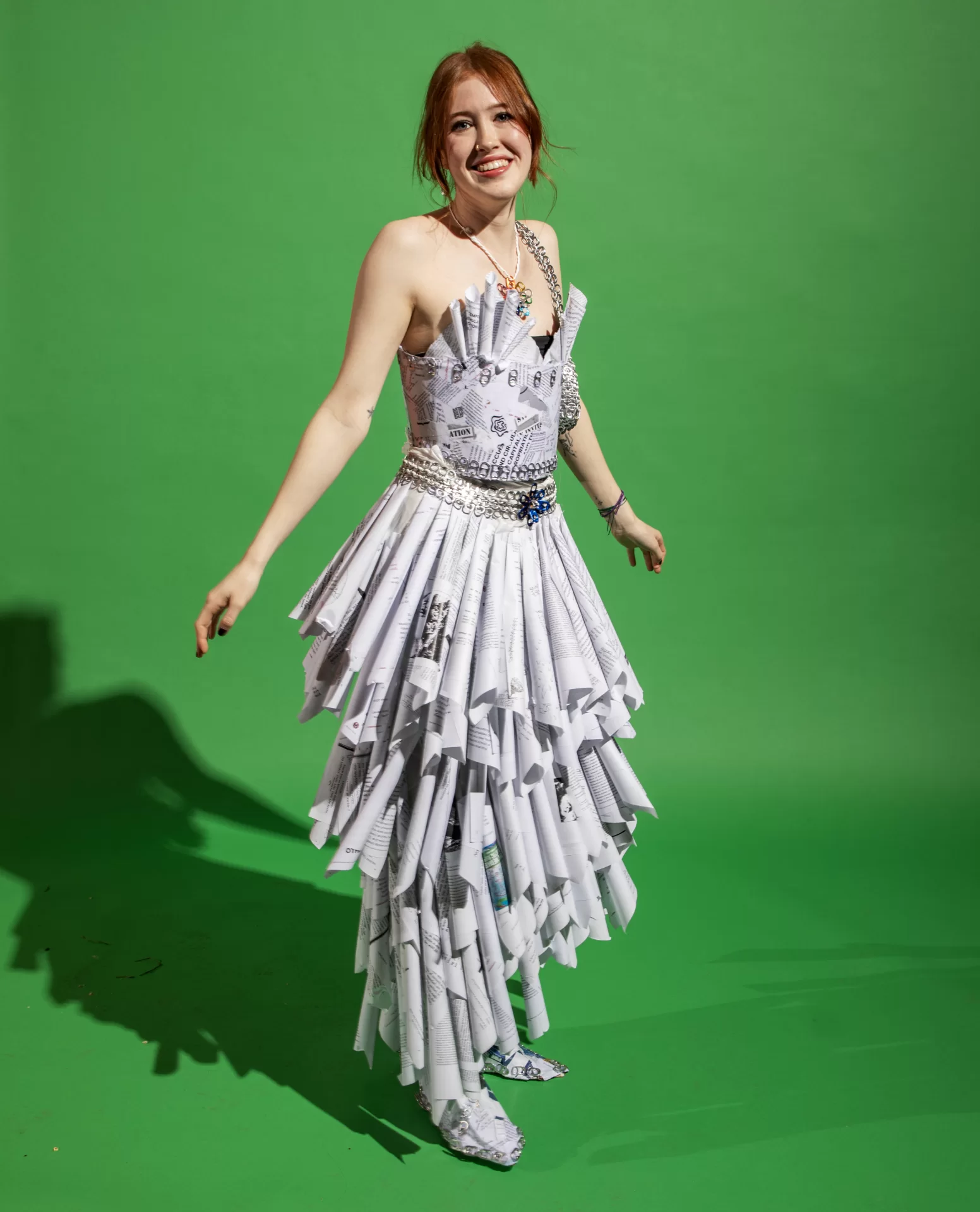
“We print readings all the time,” Thomas said. “This is several hundred pages of readings.”
As with many Trashion looks, the dress was difficult to fully try on until the night of the show, when the designers were able to securely tie everything into place.
“This is the best we’ve ever seen it,” said Robinson, an economics major.
Thomas also sported jewelry and a purse made from soda tabs. The designers collected about 10 percent of the soda tabs themselves, Robinson said, while a friend’s mom collected and donated the other 90 percent.
The two designers completed the look with boots crafted from the same printed readings, accented with soda tabs snaking around the sides and fronts of the shoes.
Third Time’s the Trashionista
The Team: Kirk Read, Professor of French and Francophone Studies, and Kerry O’Brien, retired Assistant Dean in the Dean of the Faculty office
Signature Use of Trash: 25 years of collected The Adventures of Tintin calendars
In his third year of walking in the Trashion Show, Read took home third prize. His tunic, covered in images from the world of Belgian cartoon character Tintin, could be considered a vintage piece, with some of its materials dating back over two decades. Read walked down the runway to the tune of “Love Hate Song” by none other than musician Alisa Amador ’18, who, as a student, was Read’s thesis advisee.
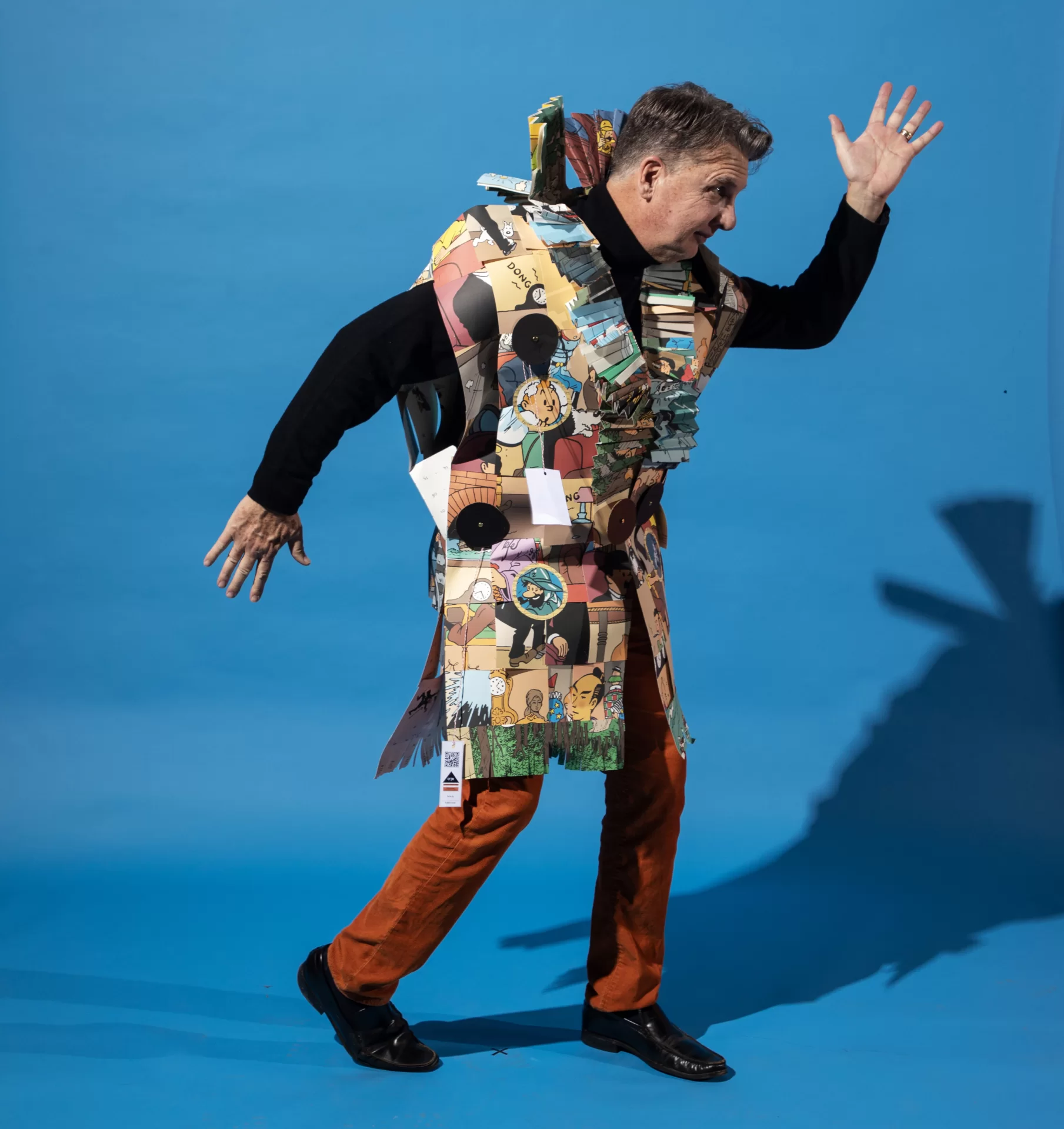
The piece introduced a new style of fashion that Read dubbed “acleisure:” academic leisure clothing.
“I am a fanatic of Tintin,” Read said. “I am both an advertisement and a ‘trashionista.’”
Kerry O’Brien, a retired assistant dean in the Dean of the Faculty office and previous Trashion Show designer, assisted Read with this year’s creation. Their one-of-a-kind work doesn’t come cheap — a tag dangling off of the design proudly touted the name “House of O’Brien-Read” alongside a hefty price of 4,000 euros.
“I love the creativity. I love the students in this,” Read said of the Trashion Show. “I’m not here to win. I’m here just to have fun and to look at what they can do. It’s just amazing.”
Groooooovy!
The Team: Juno Rogers ’28 of Decatur, Ga., Natalie Damer-Salas ’28 of Atlanta, Ga., and Ella Hassler ’28 of Kent, Ohio
Signature Use of Trash: Trash bags, sourced straight from dorm garbage
With this piece, modeled by Hassler, the designers got scrappy and scrounged materials from their dorm garbages.
“We looked through the trash rooms in our various dorms, and we found these supplies,” Rogers said.
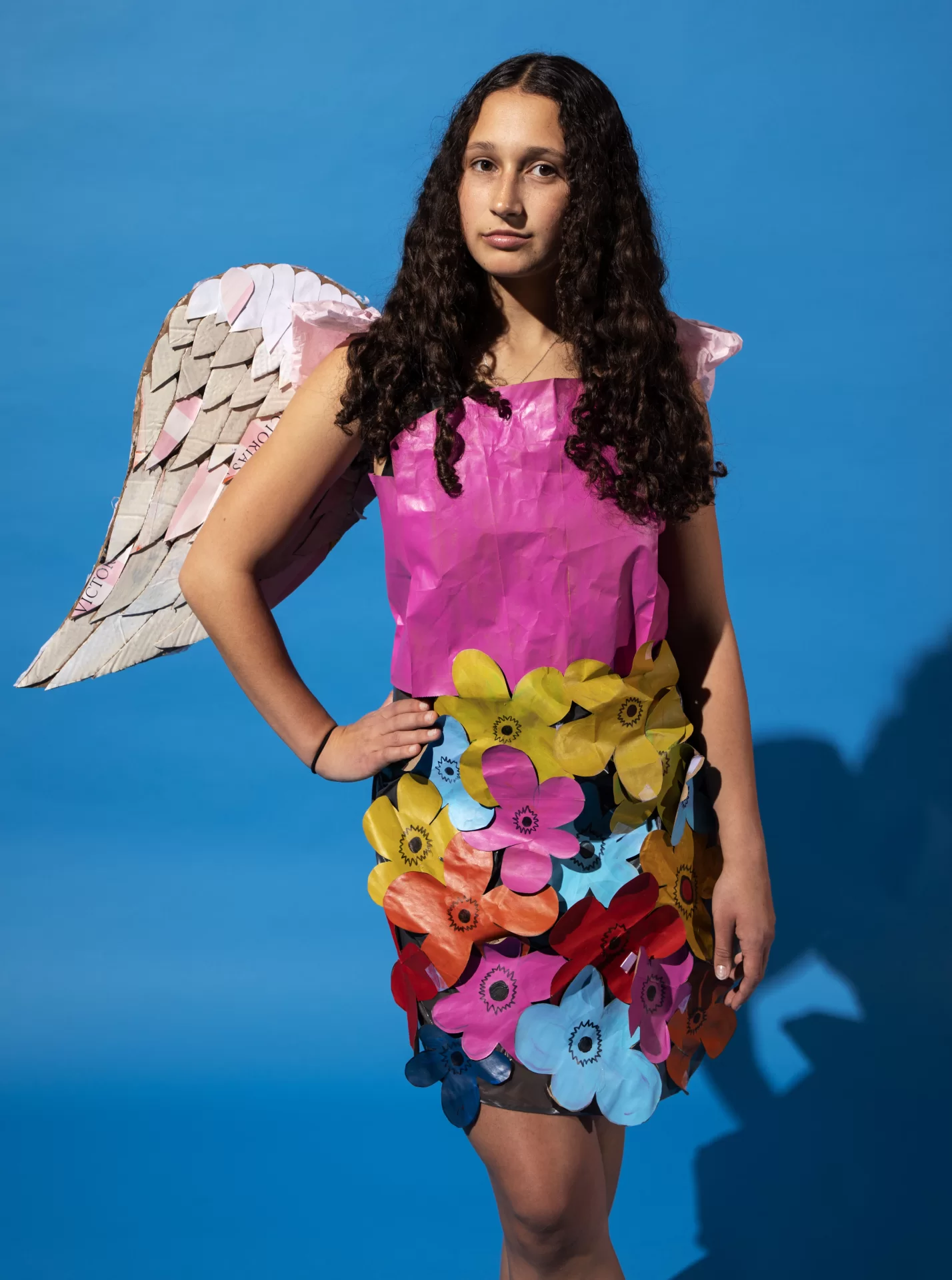
Using paper bags, cardboard boxes, and trash bags, they crafted a dress with a hot pink top and matching colorful skirt adorned with flowers. Angel wings coated in trash feathers completed the look and evoked Victoria’s Secret’s signature design, popularized by the brand’s runway show.
The designers found inspiration for the neon dress in the Finnish brand Marimekko, whose multicolored, flower power-esque designs came to represent women’s freedom in the hippie ‘60s.
“Even though Marimekko is a consumerist brand and uses flashy colors, it’s always stood for more progressive values,” Rogers said. “The bold colors on our dress are supposed to represent Bohemianism and the intersection between consumerism and Bohemianism.”
Trash Transformed to Tradition
The Team: Shristi Tamang ’28 of Kathmandu, Nepal, and Mari Nolasco Alcantara ’28 of Tlaxcala, Mexico
Signature Use of Trash: Real flowers in resin
For her bright set of clothing, designer Tamang drew inspiration from her home country of Nepal.
“It was inspired by a Nepali Tamang Selo,” Tamang said. “It’s about vibrant skirts and a top.”
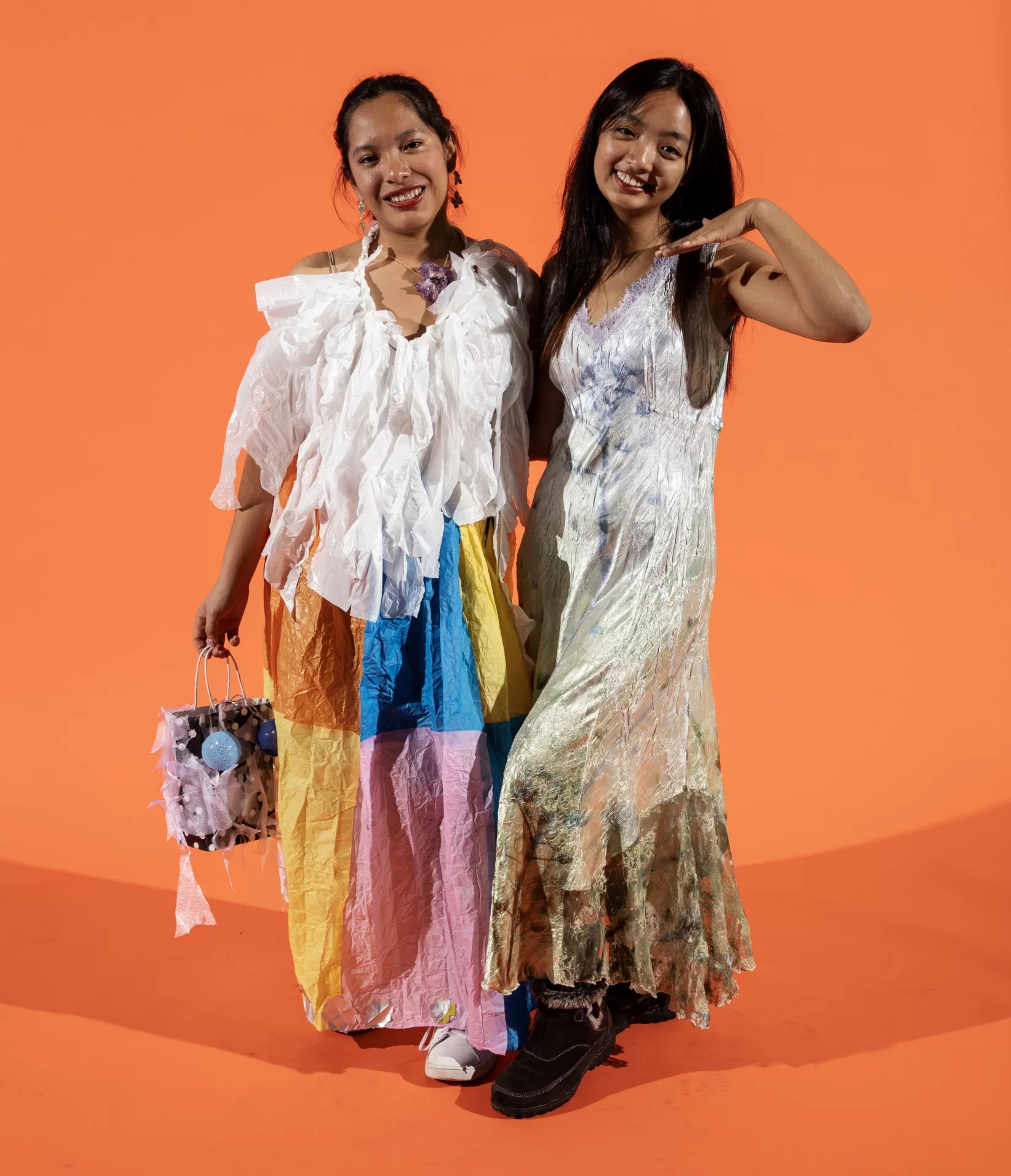
Tamang’s design, featuring a white blouse and flowing skirt composed of bright blocks of paper, echoes the elegance and vibrance of the dresses often worn by performers during Tamang Selo, a music and dance of the indigenous Tamang people of the Himalayan region of Nepal.
Accompanied by Taman Selo music, Alcantara modeled the outfit, showing off the light, airy skirt and matching white top as she glided down the runway. Tamang created the colorful skirt from gift wrapping paper and accessorized the outfit with a jewelry set handmade from flowers preserved in resin. A purse adorned with the same plastic material as the blouse completed the look.
“These are made from real flowers,” Tamang said, pointing toward a bright purple flower on Alcantara’s necklace. “Even the earrings are made from real flowers.”
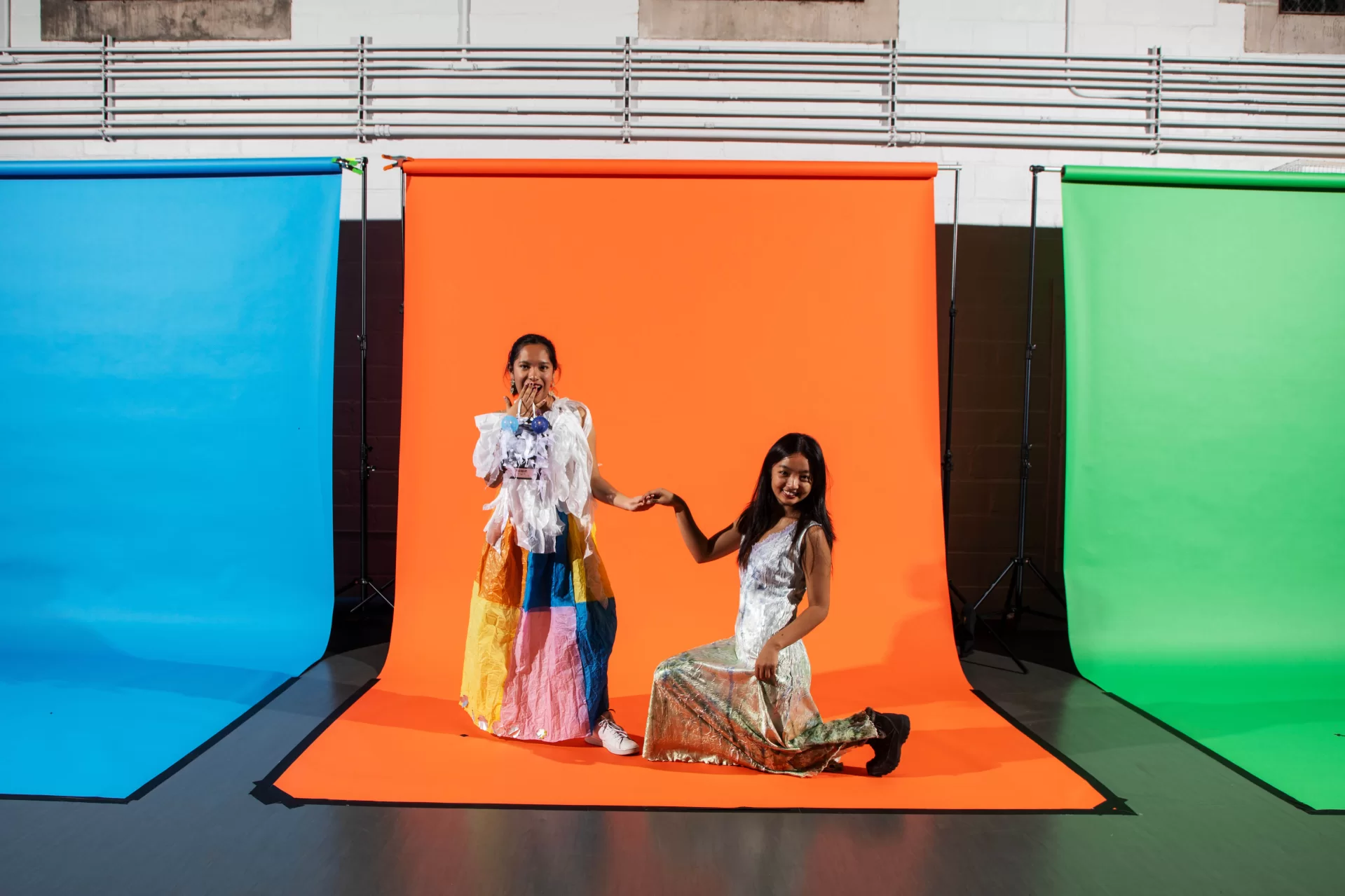
Sustainable Material, Girl!
The Team: Vera Song ’27 of Naperville, Ill., Sadie Rooney ’27 of Andover, Mass., and Ellie Millard ’26 of Harrison, N.Y.
Signature Use of Trash: Red Target shopping bags
Rooney took the stage in this group’s bright red, bullseye-patterned skirt, complete with a matching trail, to prove that being fashionable can be an eco-conscious endeavor.
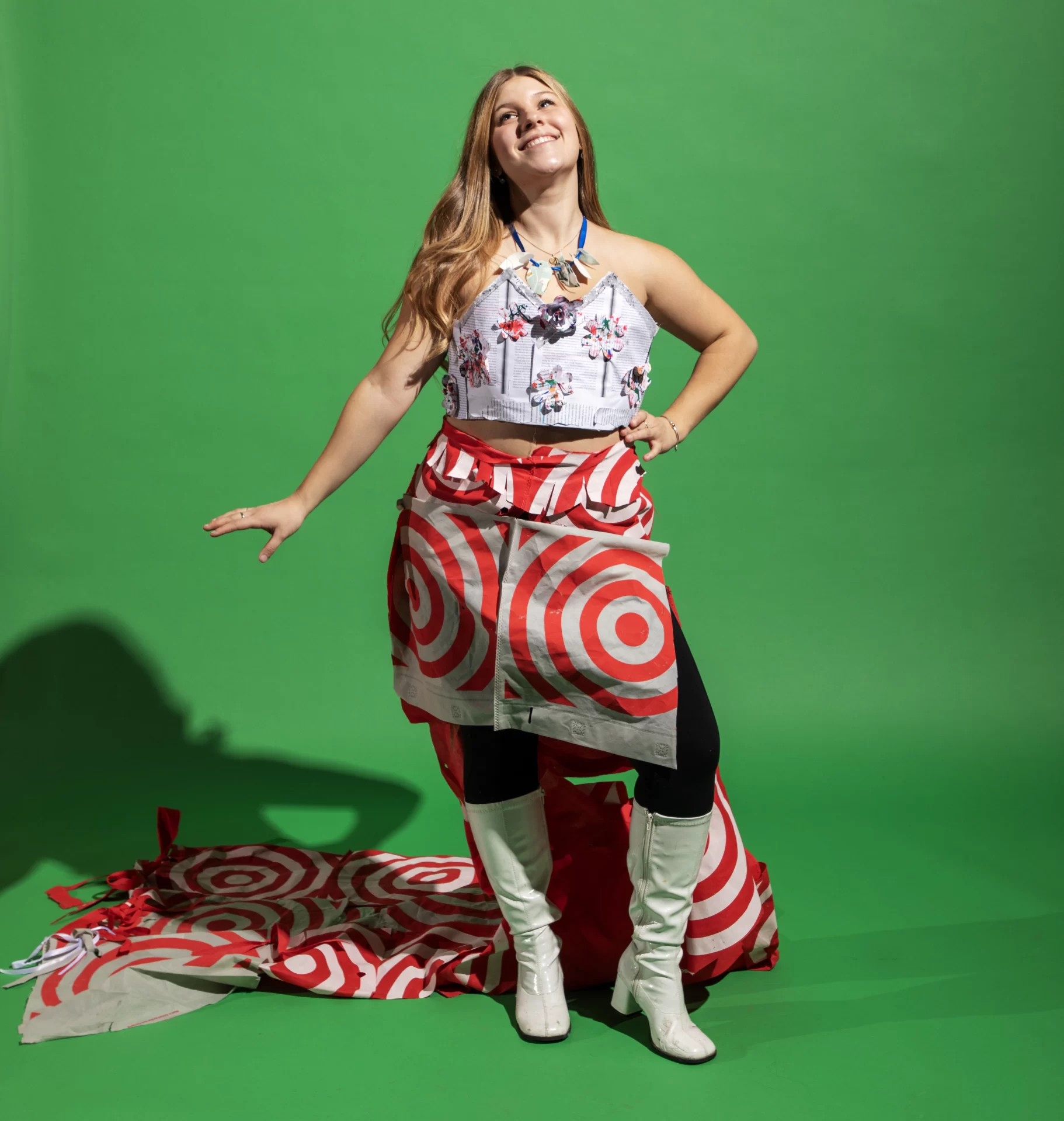
The designers created the top of the look, a white crop top adorned with paper flowers, from reused academic readings, including articles about the environment, and used cups.
“We’ve tried to pull in readings that we were assigned in class or had to print out for class because we felt like they should be repurposed in some way,” said Rooney, an economics and environmental studies major.
For the bottom of the outfit, the designers shaped Target shopping bags into a lengthy, elegant skirt.
The designers are members of Plant Futures, a student organization dedicated to plant-centric food systems and sustainable practices. Both the readings and bags were unused items that the students had sitting around their homes.
In her white and red outfit fit for a billboard, Rooney looked straight out of a Target ad campaign touting sustainability. In the words of their runway script, “you can be fabulous and eco-conscious, no material world required.”
Time and Space Travel
The Team: Sophia Porecca ’28 of Sugar Land, Texas, and Celia Horowitz ’28 of Salt Lake City, Utah
Signature Use of Trash: Discarded chemistry glasses
Porecca and Horowitz turned back the clock with their ’80s space pop-inspired piece.
The designers made this outfit from tissue paper, Monster Energy drink packaging, and an Amazon package.
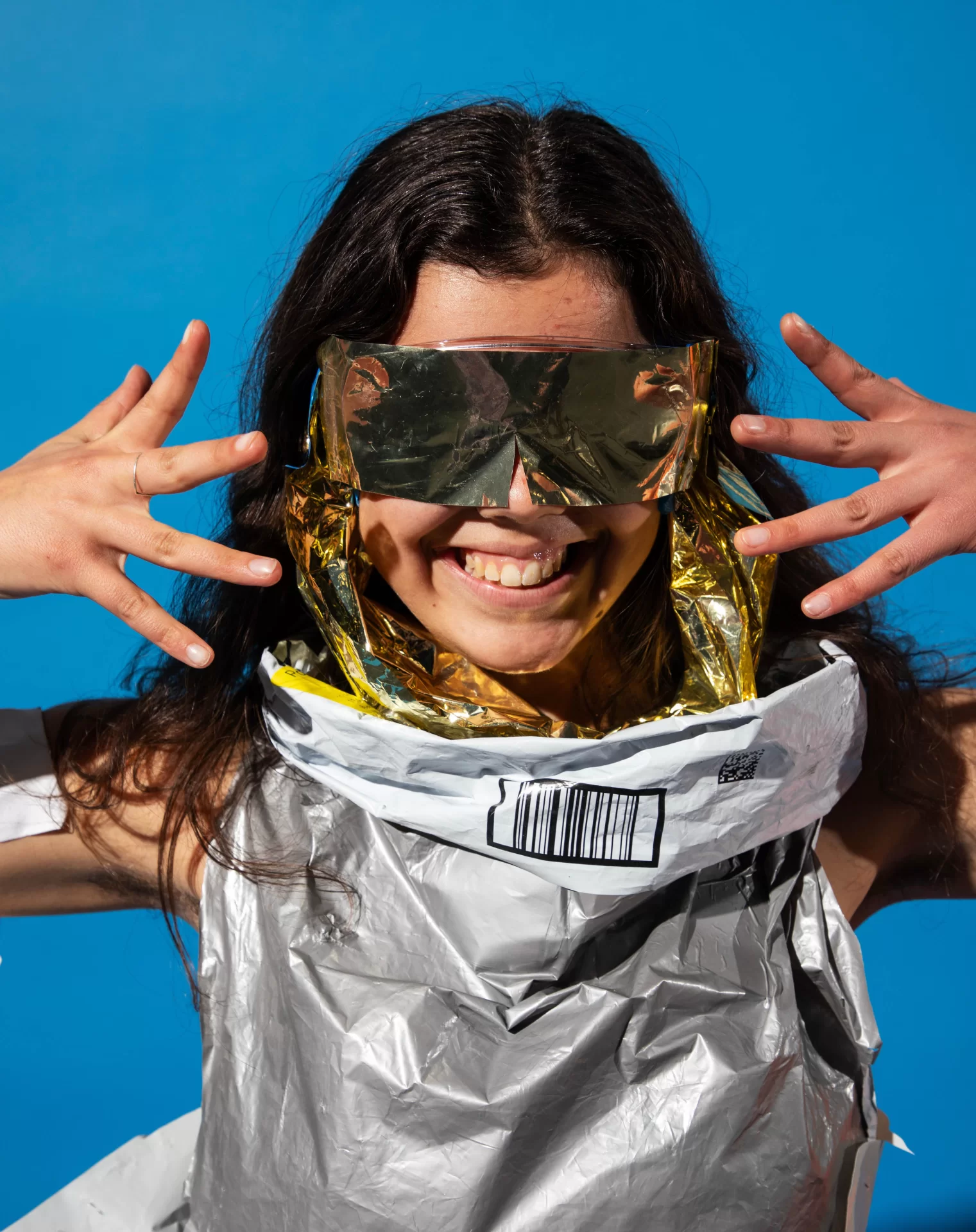
Gathering the materials made them realize “how much trash we normally use on a day-to-day basis. I think that’s the whole point of the exhibition,” Porecca said. “It was really cool to see how much we could accumulate. We didn’t even end up using more than half of it.”
They completed the look with Horowitz’s discarded chemistry lab glasses, fashioned from a plain academic accessory into out-of-this-world gold reflective goggles. She echoed Porecca’s sentiment about the sheer volume of waste.
“It’s a big pile,” Horowitz said of the trash the two accumulated while making the project. “We didn’t realize.”
Coffee Bags and Milk Machines and Broken CDs, Oh My!
The Team: Cheryl Lacey, Director of Dining Services
Signature Use of Trash: Coffee creamer pump turned antenna
This was Lacey’s third and final Trashion appearance — she retires in January. For her eclectic amalgamation of food packaging made glamorous, the judges awarded Lacey with second prize.
In her role as director of Dining Services, Lacey sees firsthand the amount of waste generated by food packaging.
“One of the things about packaging in food service is a lot of plastic,” Lacey said. “It’s necessary because you’ve got to worry about food safety. You have to worry about freshness and quality so it’s necessary but most of that’s not recyclable.” Someday, she hopes, food packaging will be sustainable and safe.
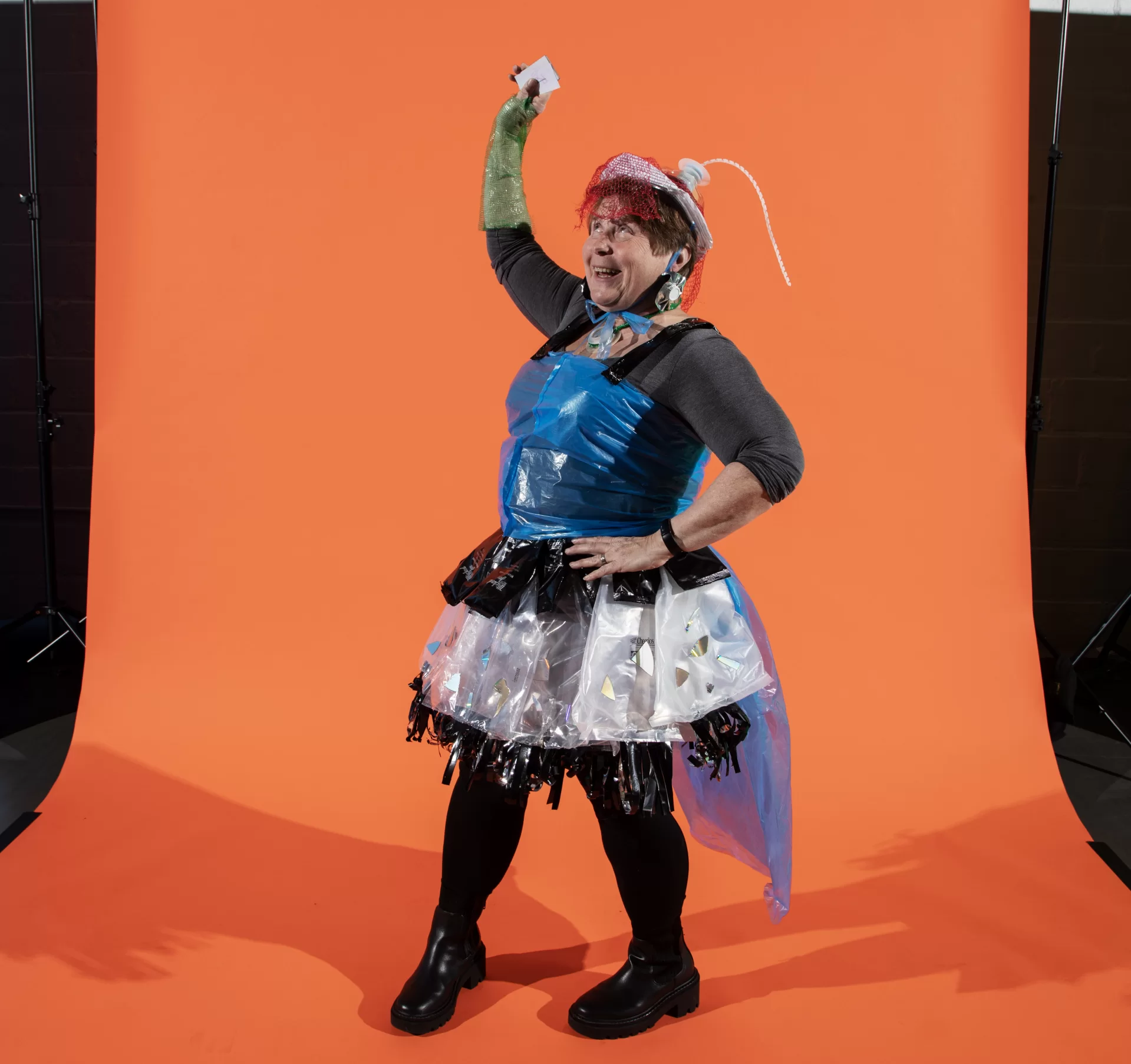
To craft her quirky, almost extraterrestrial outfit, Lacey incorporated waste from Commons and other locations. Materials included plastic pasta bags, coffee bags, chocolate chip bags, a bag for limes, a bag for clementines, a container for watermelon, milk machine parts, alternative milk item packaging, and broken CDs. The pump from inside a coffee creamer carton perched on her head like an antenna completed the striking outfit.
Lacey’s participation in creative and illuminating events like the Trashion show will be part of her legacy at Bates as a lively, dedicated staff member.
“I think it does call attention to the issue of waste and trying to divert waste from the waste stream, but beyond that, it just brings out the creativity in people and you see the most inspiring outfits,” Lacey said. “It’s amazing to see what people can do with trash. Amazing.”



